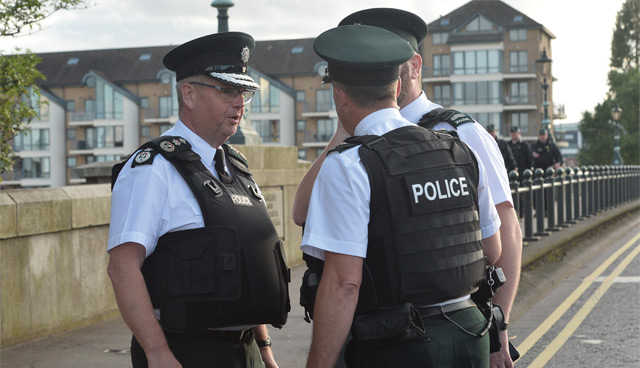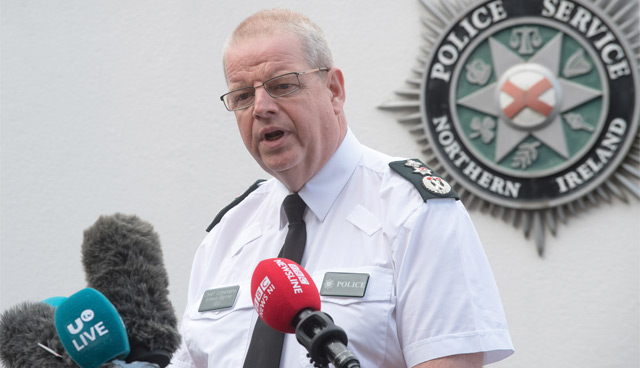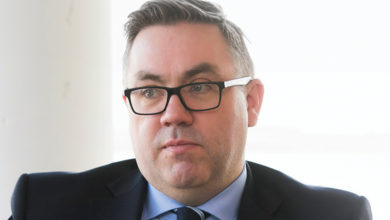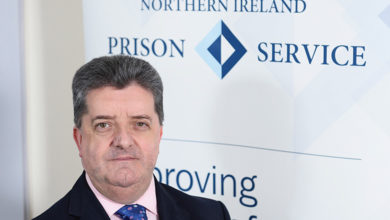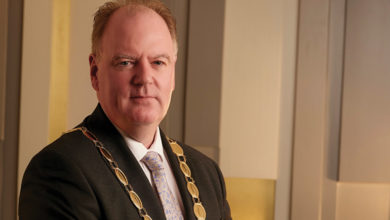A different beat
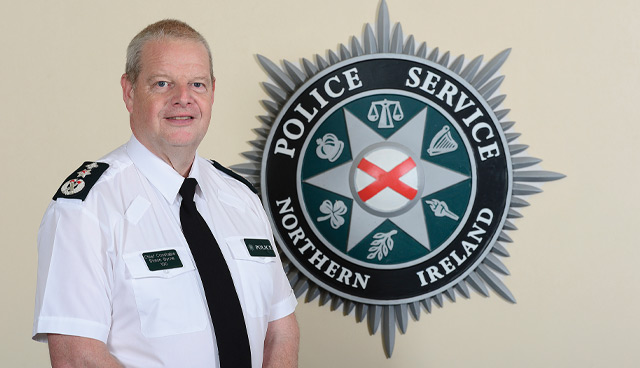
Approaching one year in post, PSNI Chief Constable Simon Byrne speaks with David Whelan about his core planks of change for the organisation, understanding the societal nuances of Northern Ireland and preparation for dealing with COVID-19.
Byrne, a former Chief Constable of Cheshire Police, who boasts 36 years of experience in policing including senior positions within the Merseyside, Greater Manchester and the Metropolitan police forces, was appointed to Northern Ireland in May 2019.
He describes the “uniqueness of policing a country” as one of the factors behind his decision to seek the role, as he does the fact that the PSNI is the only fully armed police organisation in the whole of the UK.
“It’s somewhere I felt an affinity with because of the issues and challenges that I identified. It played well to my experience base policing big conurbations in London, Liverpool and Manchester. I thought I had a lot to offer in terms of experience.”
Byrne explains that he did not join the PSNI on a reform ticket. He admits to having been hired into previous roles to “fix problems” but didn’t get the sense that this was the case within Northern Ireland. He also acknowledges a sense of anxiety around coming to a place with a strong sense of history and tradition, recognising the need not to be seen as “too critical, just for the sake of it”.
However, he describes his early interactions as positive, outlining constructive feedback, particularly internally, on his initial thinking for changes. This he says, has manifested itself into three key planks of change, which fell into place in the past six to eight months.
The first is an early decision to invest more officers into neighbourhood policing. An additional 400 officers are expected to pass out by the end of March in what Byrne describes as “a big totemic stamp of approval for that type of policing”. Byrne says that he has never taken the position to second guess the decision made by his predecessor, George Hamilton, three years ago, to drastically scale back neighbourhood policing amidst budgetary pressures but sees it as a key lever of public safety to have a “visible, trusted and accessible presence” in communities across Northern Ireland.
He admits that following Boris Johnson’s investment in officers in England and Wales, the Barnett consequential of which did not go directly to the PSNI, the absence of Government in Northern Ireland “probably gave me largesse to be able to talk about a need and a vision [of officer numbers] that perhaps I couldn’t do now”.
Byrne’s vision for growth in the PSNI’s ranks is to 7,500 officers, the same figure identified in the Patten report. This, he explains, is not a coincidence. “My first visit to Northern Ireland was to look at the Patten report. I think it’s a blueprint for policing and I still think policing in England and Wales could learn from it. The figure of 7,500 officers for an organisation moving towards a more peaceful environment seemed to land well with people and has become on of our planks of change.”
The second plank of change identified by Byrne is that of the PSNI’s estate and its efficiency as a modern police force. Explaining that the current layout of three key sites across Belfast, as well as the physical layouts of these individual sites, is proving disruptive, Byrne highlights that the person responsible for leading the PSNI’s COVID-19 response sits some 500 metres from him” through a series of corridors, steps and locked doors”. Similarly, two members of his senior team work on a site five miles from him and have to travel for regular face-to-face meetings.
Explaining that this problem is one being managed by all PSNI staff, Byrne outlines a desire to see the key sites rationalised and to see the creation of a campus-style HQ, making communication and teamwork easier while increasing efficiencies, most notably cost.
“I’m the landlord of 185 portacabins, 40 per cent of which are condemned but continue to be worked out of. In the modern world, where we are at the cutting edge of fighting crime and terrorism, which we do really well, the environment some officers work in beggars belief.”
Byrne has a similar view for a new police college, explaining that while the current re-purposed 1960s catering college is a place of “optimism”, where values and attitudes are enshrined, these could be improved in a purpose-built facility.
The third plank of Byrne’s vision for change is that which he defines as the “digital PSNI”. Byrne admits that the PSNI is out of step with most of the commercial world in relation to agile working and believes that better usage could unlock vast amounts of potential within the PSNI’s officers and staff. Looking specifically at officers, Byrne says that the PSNI has historically failed to invest in its mobile data and is behind other places that he has worked. To this end, the PSNI are assessing the handheld technology necessary to support frontline staff.
Culture
As the PSNI strives to consolidate its ranks, a recurrent question is that of representation. The PSNI has a legacy of cultural underrepresentation of Catholics, women and ethnic minorities in its ranks. Byrne is adamant that he wants to create a more diverse workforce and points to recent, though relatively minor, increases in latest recruitment campaigns of Catholics. Alongside this he identifies increases in the number of females, members of the LGTB community and black and minority ethnic communities.
However, he is also aware of an attrition in the number of applicants and those who complete the process, “disproportionately affecting people from different backgrounds”. Asked whether he had given consideration to Patten’s other recommendation of 50:50 recruitment, the policy, which ran for 10 years and successfully increased the number of police officers from a Catholic background from 8 per cent to 31 per cent, he says: “Patten helped us shift from a very low base in Catholic officers to pretty much where we are now, one in three. Given the demographics of the country we are aiming towards parity. You would never rule out 50:50 recruitment because my experience of life is that once you give something up, you rarely get it back… but it’s a political decision and in some places a divisive one, so I think it’s an action of last resort.
“I also think the conversation is polarised in that if you’re really about representation then 50:50 should apply to women as well, and it’s never mentioned in those terms.”
Byrne adds: “At the moment our planning and assumptions are for incremental change but the sword of Damocles which is there is that our age and service profile means that if we don’t continue to make improvements and encourage more Catholic officers the ratios will start to reverse and that will be quite a serious threat to our legitimacy.”
Byrne is cognisant of wider cultural change, recognising the PSNI’s attributes in responding to crises and pressure but also wanting to adapt the best of that to ensure greater “fleet of foot” and better “real-time, smart decision-making”. Cultural change, he accepts won’t happen overnight, given the PSNI’s 10,000-strong size compared to average recruitment of some 300 people per year but is eager to stress the many attributes the current force organisation exhibits.
“I’ve experienced some of the best and most committed people I’ve ever worked with within the PSNI but it’s still a world where we are very orientated around commander-control type leadership and where we groan under the weight of rules and bureaucracy. We want to give people the confidence to act more independently and I think that’s the big cultural change piece, however, in doing so we must also address the tension between being seen as visible and accessible, while also regularly issuing security bulletins to our staff.”
Byrne has had to get to grips with the tensions surrounding visible policing in parts of Northern Ireland. At Christmas, just over six months in post, he made headlines when he tweeted out an image of himself alongside heavily armed officers at the part-time station in Crossmaglen, County Armagh. The Chief Constable later apologised and removed the tweet, after initially defending it as portraying the “stark reality” of officers policing the environment they work in.
Describing how the incident served as a personal point of learning, he says: “In innocence, I pop up to probably one of the most fortified police stations still in western Europe on Christmas day and take what I thought was an innocuous picture, which gets an enormous public reaction.”
For some people the image served to highlight the reality of policing, for others it was militaristic and aggressive, with echoes of memories of the past, explains Byrne, adding that the backlash prompted him to question the behaviour.
“Why did a number of police officers decide to come out of the front door carrying heavy weaponry and none of us gave it a second thought? I’m not blaming anyone for it because the question that came out of it was back to culture, have we created those conditions?”
As a result, the PSNI have launched a review of policing in south Armagh, which will be community-led. “It’s already growing up to be a fascinating insight into our organisational mindset and that of the publics.”
Byrne admits to a degree of naivety on his part but also highlights the significance of the challenge of adapting to the policing context of Northern Ireland.
“If I’d taken the picture in Trafalgar Square or Manchester airport, no one would have batted an eyelid but hindsight is a gift and I probably stood there with my GB hat on, not my Northern Ireland hat.
“Within a short time images started appearing of police officers from the past looking similar and equally some of the history of what happened down there. I sort of get it. But, without being arrogant or complacent, this is such a unique step for anyone, I’d argue, coming from GB into this policing context.
“If you think just a few days after Crossmaglen, we’ve ended up with an unholy row around the RIC commemorative arrangements, which throws back to the Black and Tans of effectively 100 years ago. So, how far back in history do you need to be sensitive to the various nuances and feelings? I probably learned to be more cautious than careful.”
Byrne believes caution is required to prevent Northern Ireland’s historical context dominating attempts by the PSNI to improve Northern Ireland. Pointing to hostility to policing which he has experienced in areas of England, he explains that the building of trust will inevitably take time. Neighbourhood policing, which along with visibility and security, will also make a greater contribution to crime prevention through enhanced relationships with the public and partner agencies is a key factor in building such trust.
“Poverty continues to be a major challenge in Northern Ireland and I see a key role for policing in improving economic prosperity. Greater levels of crime prevention are an enabler of encouraging more people to invest and start business in Northern Ireland. Investment is necessary to improve the standards of education and housing for some of the most deprived communities and the PSNI can help to create the conditions for success,” Byrne says.
COVID-19
The Chief Constable Byrne is well aware that the aspirations and visons he discusses, especially those dependent on resources, will potentially be impacted by the unprecedented of COVID-19 pandemic and its effect on the public purse.
Speaking on 16 March about preparation, he highlights how high-levels of intense planning around Brexit have helped mitigate some of the challenges now facing the PSNI. For instance, the PSNI have a clear insight into their workforce’s resilience in relation to skills gaps now and into the future.
The PSNI is currently holding daily command-control meetings and Byrne himself chairs a more senior meeting on the impact of the virus as it affects the region and the organisation three times a week. At the same time, they are in contact with both counterparts in the Republic and in Scotland. In the coming weeks the organisation will likely have to make fundamental decisions such as assessing the safety of the 500 or so members within their policing college, alongside the likely impact any closure will have on the long-term efficiency of the organisation.
Byrne says that flexibility will be required as the PSNI continue in the role of keeping communities safe, including halting the spread of infection to the most vulnerable parts of society, and supporting their blue light colleagues.
Concluding, Byrne says that he has not yet set a timeframe for his tenure. His contract is for five years but this can be extended by mutual agreement and he recognises that work to evolve and develop the PSNI will never be complete.
He describes a job of “rebalancing the seesaw”, explaining that upon arrival, he heard a lot about the issues such as legacy, parades, flags, bonfires and terrorism but little about the organisation’s handling of low-level crime, things he says which “affects most of [citizen’s] day-to-day lives. I see my job as rebalancing the seesaw and bring more focus to the day-to-day business outputs.”

